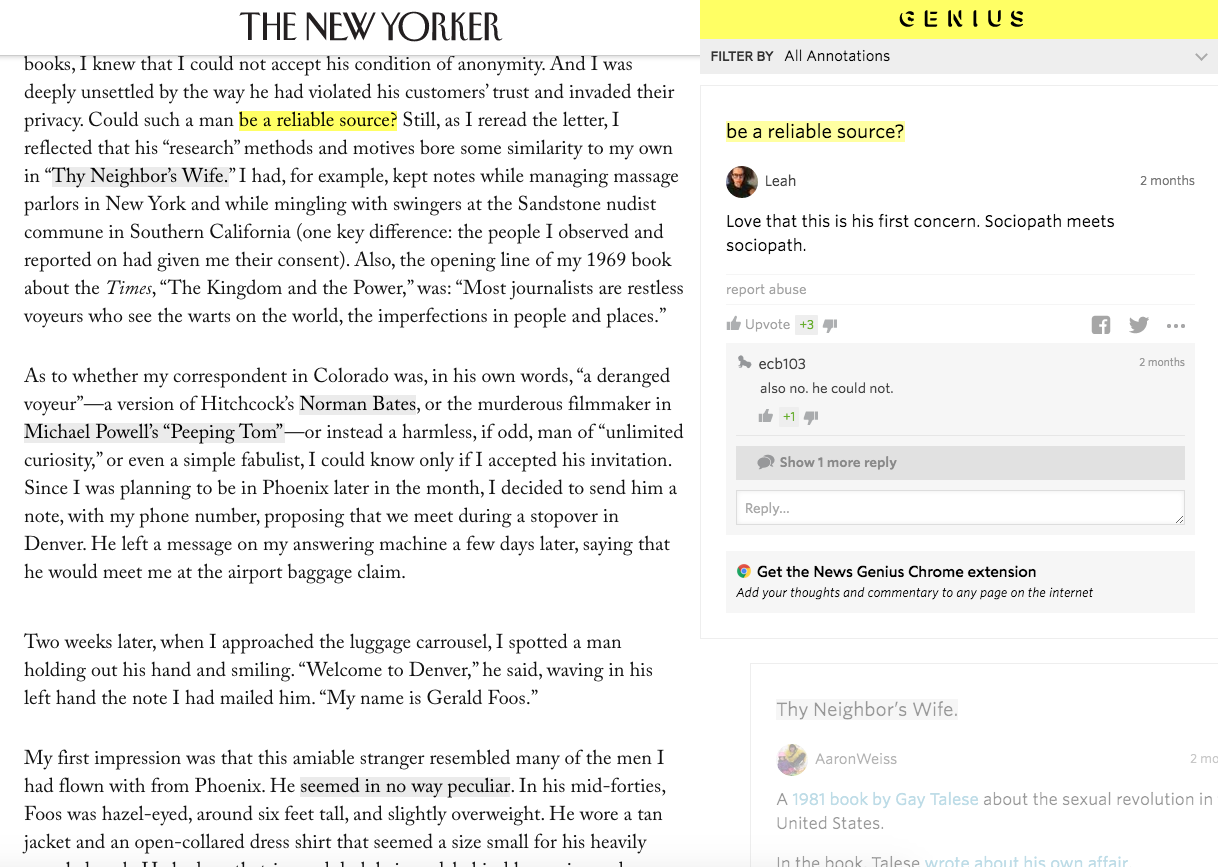Media
Sponsored Comments: Can Genius Build the Next Big Ad Platform?
Three years ago, I sat in a sleek startup office as the co-founders of Rap Genius told me about their master plan for taking over the internet.
Rap Genius—now known as Genius—was one of the hottest new tech companies at the time, with big funding, pop culture relevance, and co-founders eager to get headlines, good or bad. The site began as a place where people could decode song lyrics, annotating explanations on the side of the page while other users could upvote or downvote the explanations. As the community grew, the focus broadened from just rap lyrics to all music, some poetry, and even historical documents. But at some point, the founders needed to monetize.
Like every other digital phenomenon, the startup seemed headed down a path toward reliable revenue. In other words, Genius would have to work with brands. But somewhere along the way, that momentum stalled.
Genius deserves a lot of the blame for that. Near the end of 2013, Google penalized the company for some shady SEO practices. In 2014, former co-founder Mahbod Moghadam resigned after he made controversial annotations related to the 2014 Isla Vista shooting. Overall, the company seemed to be a case study of tech startup irreverence, pissing off everybody from Warren Buffet to Mark Zuckerberg to Jay Z. So for the last few years, Genius coasted by on $40 million of VC money.
You’re not supposed to build your house on someone else’s land. But if you build houses on everyone’s land, that could compensate for the lack of control.
But perhaps a bigger part of the problem is that Genius wasn’t a typical social network. Compared to the major social platforms, Genius is unique. You can use it to learn about Kanye West’s quadruple entendre on racial politics or find out that the chorus to Rihanna’s “Work” includes Jamaican Patois words, not gibberish. It’s more like a blend of Wikipedia and Reddit. But it isn’t necessarily a site you visit for hours every day. If you’re curious about a song, you probably look up the lyrics and bounce.
This March, however, The Wall Street Journal reported that Genius finally hired its first chief revenue officer as it prepared to build an advertising business. Around that time, the company also debuted its web annotator that lets people comment on any web page. These two developments could lead to impressive branding opportunities. But they could also expose Genius as a worthless ad platform.
At best, the tool adds important context and analysis to news. At worst, it fuels trolls who can now force their two cents on whatever they want.
Currently, the web annotator functions as a browser extension, meaning it’s purely opt-in. For those who have the extension, annotations get marked by highlighted yellow text on the web page, and if you click on the yellow shading, then a sidebar pops out with the user’s annotation.

At best, the tool adds important context and analysis to news. At worst, it fuels trolls who can now force their two cents on whatever they want, regardless of whether or not a particular site has a comments section. If the web annotator becomes a popular extension—a big if—then Genius has some interesting ad prospects. Platforms like Facebook, Twitter, and Snapchat control everything within their own walls. But Genius can be everywhere on the open web. In theory, it could sell ads on any web page, via its pop-up sidebar. And similar to Facebook, Genius could let publishers pay to promote related stories.
You’re not supposed to build your house on someone else’s land. But if you build houses on everyone’s land, that could compensate for the lack of control.
Another unusual wrinkle here is that Genius could force brands to deal with criticism. Brands don’t exactly love negative feedback unless it’s in a stale environment like a focus group, which is why most native ad campaigns don’t offer commenting options. But as more companies invest in publishing, it could be beneficial for them to use Genius to see how readers respond to their work. Brands are already active on every major social network, and this could just be another place to connect with consumers.
Look at Goldman Sachs, for instance. Goldman’s Twitter account, which has over 500,000 followers, is full of positive PR and industry links, but there’s no user interaction. Content is being treated as a one-sided exchange instead of a conversation. But with Genius, the company could see if readers really understood and got value out of this sponsored piece about capital markets that The New York Times T Brand Studio produced.
Of course, all of this is predicated on enough people using the extension. Facebook has more than a billion users. Twitter and LinkedIn have hundreds of millions. Genius’ original site drives a solid amount of traffic—about 12 million monthly unique visitors, per comScore—because of its SEO, but it’s unclear if the web annotator is going to take off. A few months after the annotation extension debuted, the comments I’ve seen have been sporadic, and they more often conveyed snark than insight. Thus far, Genius’ most noteworthy ad deal is a partnership with Spotify that shows lyrics and annotations during music streams.
Does Genius want to be a platform or a plug-in that lets people graffiti the internet? Can it be both? Does more money actually lead to more problems? Genius may want to annotate the world, but it needs to answer these questions first.
Image by GettyGet better at your job right now.
Read our monthly newsletter to master content marketing. It’s made for marketers, creators, and everyone in between.




